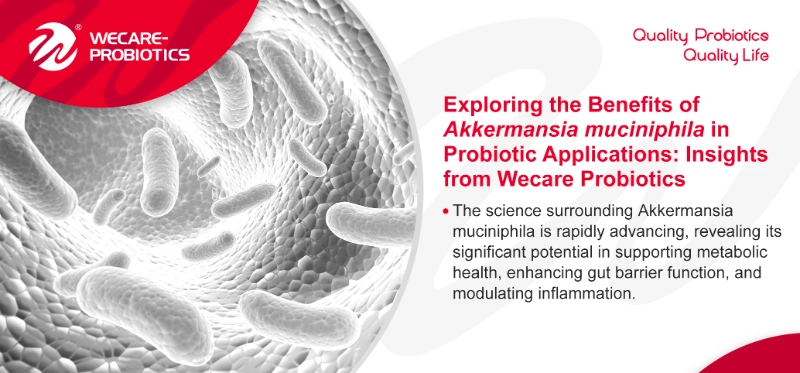Industry Insights
Home > News > Industry Insight > Exploring the Benefits of Akkermansia muciniphila in Probiotic Applications: Insights from Wecare Probiotics
Exploring the Benefits of Akkermansia muciniphila in Probiotic Applications: Insights from Wecare Probiotics

In recent years, interest in probiotic solutions has surged, with cutting-edge research spotlighting certain strains that could significantly enhance human health. Wecare Probiotics, a pioneering manufacturer of high-potency probiotic powders, starter cultures, and microecology products, offers diverse solutions for industries ranging from dietary supplements and dairy to precision medicine and personal care. Among the promising probiotics under study, Akkermansia muciniphila stands out due to its unique role in gut health and metabolic support. This article explores the latest research on A. muciniphila and its potential applications in addressing some of today’s most pressing health issues, including obesity, diabetes, and metabolic disorders.
What Is Akkermansia muciniphila?
Akkermansia muciniphila, a bacterium within the Verrucomicrobia phylum, resides naturally in the human gastrointestinal tract. Comprising up to 5% of the total gut microbiome, this bacterium has a unique niche in the digestive system, thriving in the mucus layer that lines the intestines. By breaking down mucin, a key component in this protective layer, A. muciniphila not only sustains its own growth but also strengthens the gut barrier, aiding in defense against harmful substances and pathogens. First isolated in 2004, this bacterium has drawn attention for its remarkable impact on lipid metabolism, weight regulation, and anti-inflammatory effects.
Health Benefits of A. muciniphila: Obesity and Metabolic Health
Research has shown that A. muciniphila plays a beneficial role in managing obesity and metabolic disorders. Studies indicate that individuals with higher levels of this bacterium in their gut are less likely to suffer from obesity, diabetes, and inflammatory bowel diseases. One pivotal study demonstrated that daily supplementation with live or pasteurized A. muciniphila led to slight weight loss, reduced fat mass, and lower markers of liver dysfunction and inflammation. This is especially significant in the context of obesity-related conditions often linked to gut barrier dysfunction and increased endotoxins in the bloodstream.
In studies with mice, A. muciniphila supplementation led to a thicker intestinal mucus layer, which improved gut barrier function, reduced fat mass, and promoted energy metabolism. This probiotic’s ability to reverse high-fat-diet-induced metabolic disturbances through anti-inflammatory endocannabinoid secretion underscores its potential as a therapeutic agent in metabolic health.
Anti-inflammatory and Immune-Modulating Properties
Beyond metabolic health, A. muciniphila also exhibits strong anti-inflammatory properties, which contribute to its immune-modulating effects. Supplementation with live and pasteurized forms of A. muciniphila in animal models has shown reductions in pro-inflammatory cytokines, such as IL-6 and IL-1β, while increasing beneficial immune markers like IFN-γ and IL-10. This immune response has been especially beneficial in reducing the impact of influenza infections and other inflammatory conditions. Additional studies suggest that A. muciniphila can mitigate the cytotoxic effects of C. difficile, highlighting its potential role in managing gut-related infections and immune health.
Challenges and Opportunities for Industrial Application
As a strictly anaerobic bacterium, A. muciniphila presents unique challenges for large-scale production due to its oxygen sensitivity. To make this probiotic more accessible for consumers, further research is essential to optimize its stability and viability in various formulations. The European Food Safety Authority (EFSA) has deemed pasteurized A. muciniphila safe for use as a dietary supplement, opening doors for its application at a dosage of up to 3.4 × 10^10 cells per day in specific populations.
Wecare-Probiotics and the Future of A. muciniphila in Probiotic Applications
As a leading innovator in the probiotics industry, Wecare Probiotics is dedicated to exploring the potential of A. muciniphila and other beneficial microbes. By keeping a close watch on emerging research, Wecare aims to develop advanced microecology solutions that address complex health needs across multiple industries. From dietary supplements designed for weight management to precision medicine solutions aimed at metabolic disorders, Wecare’s commitment to innovation positions it at the forefront of probiotic science.
Conclusion
The science surrounding Akkermansia muciniphila is rapidly advancing, revealing its significant potential in supporting metabolic health, enhancing gut barrier function, and modulating inflammation. As a pioneering supplier in the probiotics industry, Wecare Probiotics continues to push the boundaries of what’s possible in gut health and beyond. With ongoing research and development, A. muciniphila is poised to become an invaluable component in the next generation of probiotic products, offering a natural, effective way to support overall wellness and combat some of the most prevalent health challenges today.
For more on Wecare Probiotics’ innovations and the future of A. muciniphila, stay tuned as we continue to explore the frontiers of gut health and functional probiotic applications.
References
1. Chang, C.J.; Lin, T.L.; Tsai, Y.L.; Wu, T.R.; Lai, W.F.; Lu, C.C.; Lai, H.C. Next Generation Probiotics in Disease Amelioration. J. Food Drug Anal. 2019, 27, 615–622.
2. Derrien, M.; Collado, M.C.; Ben-Amor, K.; Salminen, S.; de Vos, W.M. The Mucin Degrader Akkermansia muciniphila Is an Abundant Resident of the Human Intestinal Tract. Appl. Environ. Microbiol. 2008, 74, 1646–1648.
3. Schneeberger, M.; Everard, A.; Gómez-Valadés, A.G.; Matamoros, S.; Ramírez, S.; Delzenne, N.M.; Gomis, R.; Claret, M.; Cani, P.D. Akkermansia muciniphila Inversely Correlates with the Onset of Inflammation, Altered Adipose Tissue Metabolism, and Metabolic Disorders During Obesity in Mice. Sci. Rep. 2015, 5, 16643.
4. Depommier, C.; Everard, A.; Druart, C.; Plovier, H.; Van Hul, M.; Vieira-Silva, S.; Falony, G.; Raes, J.; Maiter, D.; Delzenne, N.M.; et al. Supplementation with Akkermansia muciniphila in Overweight and Obese Human Volunteers: A Proof-of-Concept Exploratory Study. Nat. Med. 2019, 25, 1096–1103.
5. Everard, A.; Belzer, C.; Geurts, L.; Ouwerkerk, J.P.; Druart, C.; Bindels, L.B.; Guiot, Y.; Derrien, M.; Muccioli, G.G.; Delzenne, N.M.; et al. Cross-Talk Between Akkermansia muciniphila and Intestinal Epithelium Controls Diet-Induced Obesity. Proc. Natl. Acad. Sci. USA 2013, 110, 9066–9071.
6. Hu, X.; Zhao, Y.; Yang, Y.; Gong, W.; Sun, X.; Yang, L.; Zhang, Q.; Jin, M. Akkermansia muciniphila Improves Host Defense Against Influenza Virus Infection. Front. Microbiol. 2021, 11, 586476.
7. Nasiri, G.; Azimirad, M.; Goudarzi, H.; Amirkamali, S.; Yadegar, A.; Ghalavand, Z.; Shahrokh, S.; Asadzadeh Aghdaei, H.; Zali, M.R. The Inhibitory Effects of Live and UV-Killed Akkermansia muciniphila and Its Derivatives on Cytotoxicity and Inflammatory Response Induced by Clostridioides difficile RT001 In vitro. Int. Microbiol. 2024, 27, 393–409.
8. Xie, S.; Li, J.; Lyu, F.; Xiong, Q.; Gu, P.; Chen, Y.; Chen, M.; Bao, J.; Zhang, X.; Wei, R.; et al. Novel Tripeptide RKH Derived from Akkermansia muciniphila Protects Against Lethal Sepsis. Gut 2023, 73, 78–91.









 Leave a Message
Leave a Message Email
Email Linkedin
Linkedin